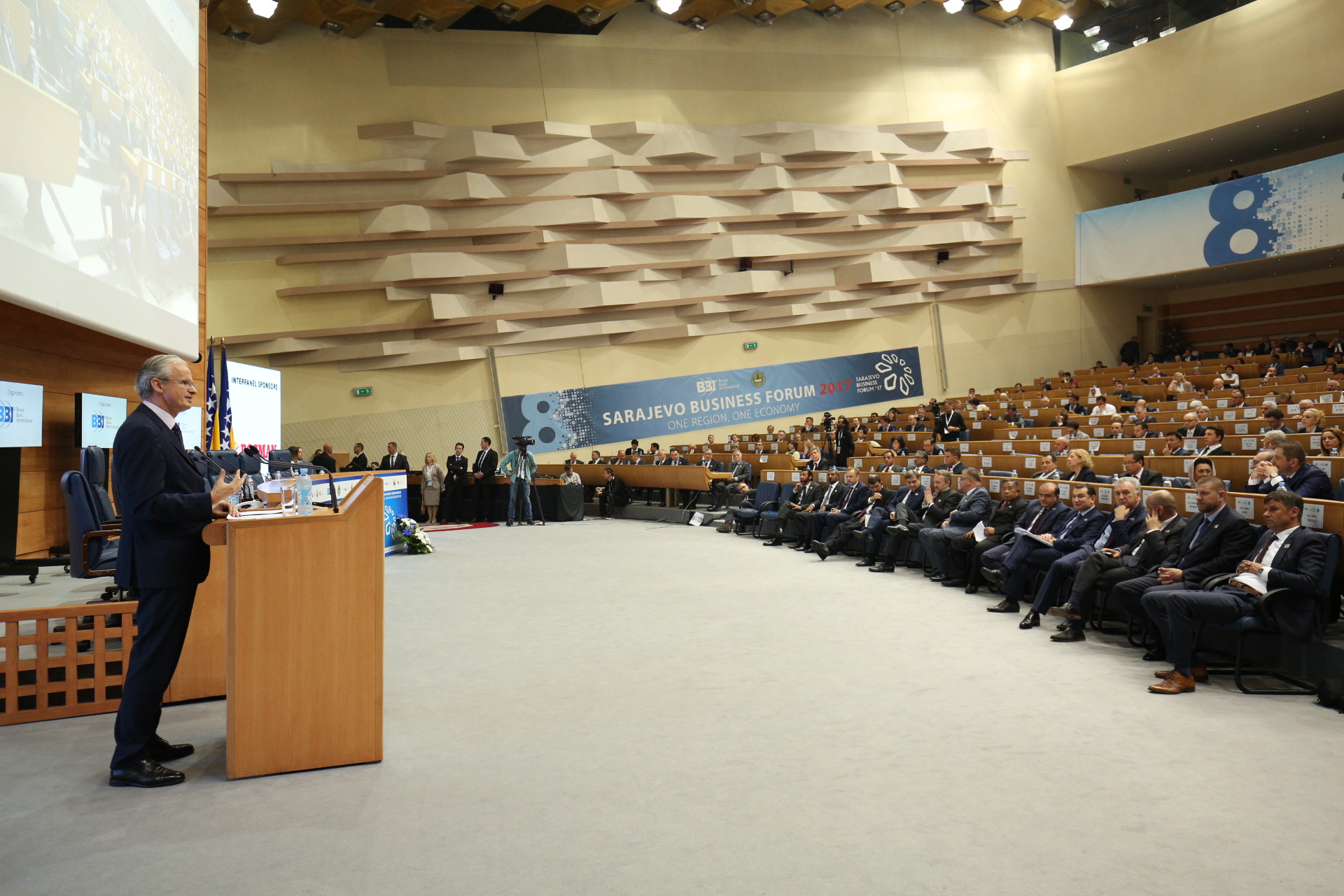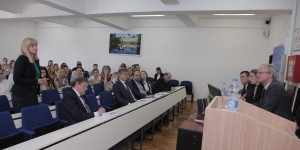[Check against delivery]
The Western Balkan region is part of Europe, and the prospect of EU membership is an important driver for economic reforms essential for enhancing trade and investments across the region. Over the past ten years, the trade flow between the EU and the Western Balkan region has more than doubled, reaching a spectacular 44 billion Euros in 2016. It is particularly encouraging to note how exports from the region to the EU are constantly increasing.
Investors know that trade is already largely liberalised between the EU and the Western Balkans, and that the progressive harmonisation of rules and standards will sustain convergence and create a level playing field for all investors.
Integration with the European Union is not only a powerful incentive for reform inside the region but also provides a “stamp of approval”, attracting foreign direct investment both from the EU Member States – as well as many other important sources of investments from Asia, the Middle East, North America and elsewhere.
More and more European companies are including the Western Balkans in their value chains; this ongoing process of business integration has been a powerful engine for creating wealth and jobs in newer EU member states such as Poland or Slovakia. There is no reason why it will not be able to deliver the same change in the Western Balkans.
But for this to happen governments across the region need to support structural reforms allowing these opportunities to materialise. Current economic models in the Western Balkan are still depending on remittances and are characterised by a consumption driven society. This economic model needs to change to attract more investments and drive exports.
The European enlargement policy is about how to make this change happen. An economy that is based on a sound functioning rule of law is also essential for attracting Foreign Direct Investments and encouraging domestic investments. A system that provides confidence to investors that their investments are protected – and corruption is limited – is one of the most important factors for investor to decide to invest in a certain country.
At the same time it is also essential for the development of a large base of SMEs. Small and medium-sized companies are not only creating most of the new jobs in modern economies, they also provide for an economy less vulnerable and more adaptable towards external economic shocks. Moreover, SMEs can play an important role as suppliers to bigger investors and become part of the international value chain.
The current business environment in the Western Balkans is still affected by several structural obstacles. These include high costs of compliance with regulatory burdens, limited access to financial market for SMEs, informalities in many parts of the economy and the presence of corruption. Strengthening Rule of Law and Good Governance is therefore crucial to improve the business environment. This requires strong and independent institutions, enforcement of legislation and modern public administrations. It also requires a profound change throughout society.
Here in Bosnia and Herzegovina the transformation necessary to move forward towards European Union accession only begun recently in earnest. Much of the past two decades were spent arguing over constitutional reforms. But two years ago the European Union adopted a new approach towards Bosnia and Herzegovina, emphasising instead the need for structural economic and social reforms, coupled with a strengthening of rule of law and improved efficiency in public administration.
The response to the new approach was swift. Your authorities adopted a Reform Agenda in July 2015, which the International Monetary Fund has termed “the most significant set of structural reforms since the Dayton agreement”. The Stabilisation and Association Agreement entered into force in June 2015 and in February 2016 Bosnia and Herzegovina applied for membership in the European Union. And your administration is now working on the replies to over 3000 detailed questions, which will form an important source of information for the European Commission’s opinion on the membership application.
Structural reforms are never easy. They require hard work and patience. But the agreement last September on an “Extended Fund Facility” with the IMF and the even more recent agreement on a new development policy loan with the World Bank speak volumes of what has been achieved already. Most economic indicators for Bosnia and Herzegovina are positive. Industrial output is up, exports are increasing and employment is growing, although the pace could be higher. What is still missing is a significant increase in investments – both domestic and international.
The reluctance of many investors to commit to Bosnia and Herzegovina, despite an impressive engagement to reforms at all levels of government, is undoubtedly a high political risk. Therefore it is essential to keep up the pace of reform and not be complacent. All too often, the first thing we hear about – not just in the case of Bosnia and Herzegovina but in the region as a whole – is the word “political crisis”. One crisis seems to replace another – sometimes they are real, but sometimes they are fabricated and used as pawns in a political chess game that is difficult for any outsider to understand.
And, as we all know, talk about crisis and risks is the last thing any serious investor would like to hear. We in the EU have had our share of crisis in recent years and are more interested in political and economic actors who can provide solutions, who are future-oriented and who are not caught in a vicious circle of past grievances.
I am convinced that if Bosnia and Herzegovina pursues its parallel path of structural reforms and EU accession, investors will overcome any doubts they may still harbour. But for this to happen, neither the much needed economic, social and legal reforms, nor the EU accession process as a whole can be taken hostage to narrow ethno-political interests. And the same goes for every country across the Western Balkans.
In fact, the whole region needs to adopt a more open and harmonious approach towards trade and investments. The Western Balkans summit here in Sarajevo just two months ago endorsed the promising idea of creating a regional economic area for the Western Balkans.
With reform-oriented governments in office across the region, it is time for a more comprehensive approach for the Western Balkans, building on the already existing “Berlin process” and the connectivity agenda. And the forthcoming Western Balkan summit in Trieste could become a landmark in this respect.
A regional economic area for the Western Balkans is not a substitute for EU membership. On the contrary, it will help prepare all the countries in the region for the much needed transition to join the European Union. Starting by harmonising certain of your national standards and bringing down barriers to trade and investment across the Western Balkans is a positive sum dynamic that everyone will benefit from. It will send a powerful message: the Western Balkans is a market of some 20 million consumers with great potential. This will attract more FDI and lead to higher economic growth and job creation. The European Commission estimates that about 80.000 new jobs could be created across the Western Balkans if the respective economies are more closely integrated. The European Commission is keen to lend its political, technical and financial support to this important objective but it will be up to the countries themselves to take the necessary steps to accelerate regional economic integration.
In the meantime, the European Union is already increasing its public investments to the region in order to physically connect the region with the rest of Europe. Through our common connectivity agenda we have allocated 1.3 billion euro worth of grants with the objective to leverage up to 13.5 billion euro of investments from the public and private sector in key energy and transport investments in Western Balkan countries including Bosnia and Herzegovina.
For this funding to be released and fully utilised Bosnia and Herzegovina needs to continue with its ambitious reform agenda. You are more than half way through it. Don’t give up now. Keep going!
Building concrete bridges and connecting territories will of course contribute to developing good neighbourly relations and promote reconciliation in a region with a bitter past.
The motto of the Sarajevo Business Forum – “One region, one economy” – mirrors the spirit of deepening regional economic integration and creating a more dynamic investment environment focusing on the development of regional business opportunities, fostering investments and creating employment.
You can rest assured that the European Union will stand by you and we look forward to working with all actors across the Western Balkans for our common good.
– Christian Danielsson, Director General responsible for Neighbourhood Policy and Enlargement Negotiations, European Commission, Brussels


